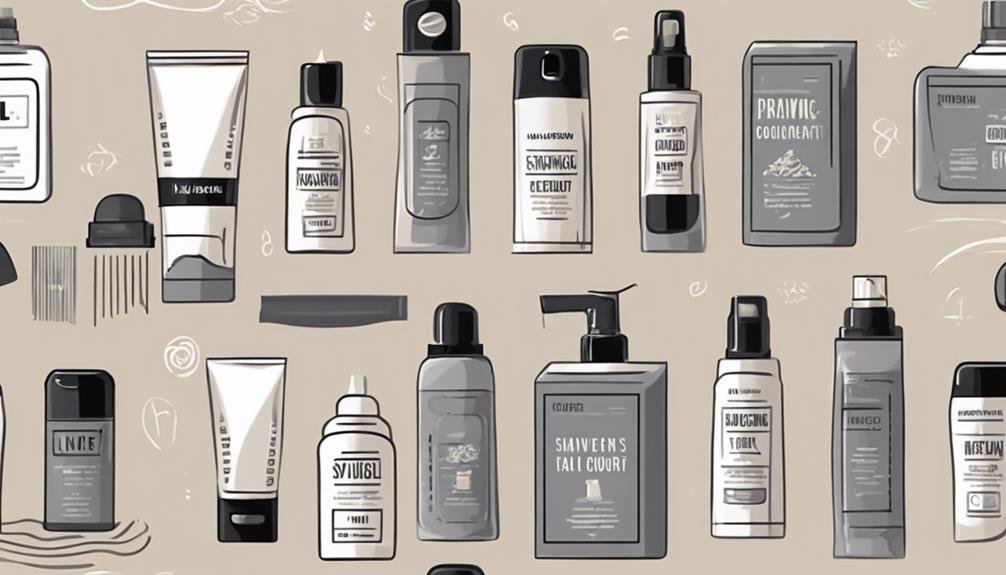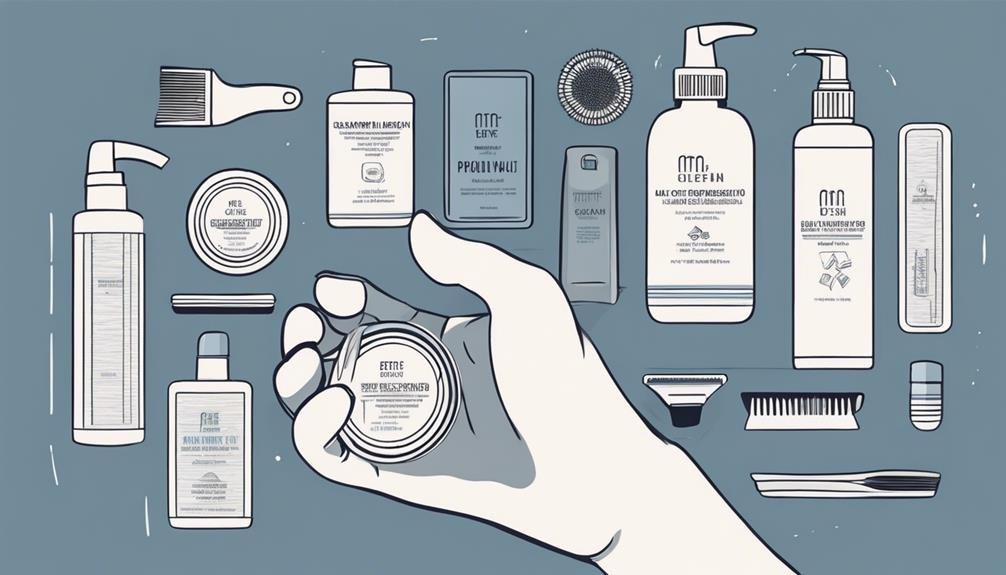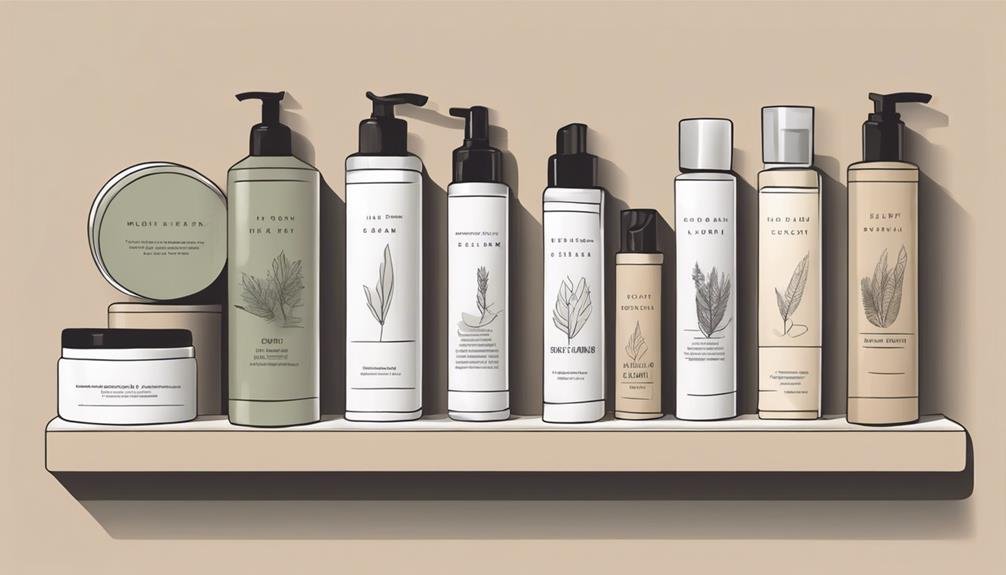How to Avoid Endocrine Disruptors in Men's Products
To avoid endocrine disruptors in men's products, start by inspecting ingredient labels. Look out for harmful substances like parabens, phthalates, and synthetic fragrances, which can interfere with hormone balance. Opt for personal care items labeled 'phthalate-free' and 'paraben-free,' and choose brands that prioritize transparency about their ingredients. Consider natural alternatives, like plant-based body washes and aluminum-free deodorants. Don't forget about laundry products and treated clothing, as they can also contribute to your exposure. Staying informed about your choices can greatly impact your health, so keep exploring safer options for better well-being.
Key Takeaways
- Read product labels carefully, avoiding ingredients like parabens, phthalates, and synthetic fragrances.
- Choose personal care products labeled 'phthalate-free' and 'paraben-free' to minimize risk.
- Opt for natural and organic brands that emphasize transparency in their ingredients.
- Be cautious with clothing and laundry products that may contain stain repellents or harmful additives.
Understanding Endocrine Disruptors
Endocrine disruptors are chemicals that can interfere with your hormone system, potentially leading to various health issues. These substances mimic, block, or alter hormone functions, which can disrupt your body's natural balance.
Exposure to endocrine disruptors may result in reproductive problems, developmental issues, and even certain cancers. You might find these chemicals in everyday products, including plastics, personal care items, and pesticides.
Being aware of their presence is essential for your health. Understanding how these disruptors operate helps you make informed choices.
Common Sources in Men's Products

Many men's products, such as grooming items and certain clothing, can contain harmful endocrine disruptors that may affect your health. Common sources include shaving creams, deodorants, and hair gels, which often use synthetic fragrances and preservatives.
You might also find these disruptors in personal care items like body washes and aftershaves. Additionally, some clothing, especially those treated with stain repellents or waterproofing agents, can leach chemicals that disrupt hormonal balance.
Even your everyday laundry detergent can contribute to this problem, as it may contain harmful additives. To minimize exposure, check labels carefully and opt for brands that prioritize natural ingredients and eco-friendly practices.
Being proactive about your choices can make a significant difference in your overall well-being.
Ingredients to Avoid
When choosing men's products, steer clear of ingredients like parabens, phthalates, and artificial fragrances, as they can interfere with hormonal health.
Parabens, often used as preservatives, can mimic estrogen in the body, leading to potential hormonal imbalances.
Phthalates, commonly found in scents, are linked to reproductive issues and other health concerns.
Artificial fragrances can contain numerous undisclosed chemicals, some of which may disrupt endocrine function.
Additionally, avoid sulfates, which can irritate the skin and may have long-term effects on hormone levels.
Finally, be cautious with triclosan, an antibacterial agent that's been shown to disrupt thyroid hormone regulation.
Reading Product Labels

Reading product labels is essential for identifying harmful ingredients that could disrupt your hormonal health.
When you pick up a product, take the time to scrutinize the ingredient list. Look for common endocrine disruptors like parabens, phthalates, and synthetic fragrances.
These are often hidden in long, complex chemical names, so don't hesitate to do a quick online search if you're unsure.
It's also wise to avoid products with vague terms like 'fragrance' or 'parfum,' as they may contain harmful substances not disclosed.
If you see anything you can't recognize or pronounce, consider putting the product back on the shelf.
Choosing Safe Alternatives
To safeguard your hormonal health, contemplate opting for products labeled as 'phthalate-free,' 'paraben-free,' or 'made with natural ingredients.' These labels can help you avoid harmful endocrine disruptors.
Additionally, look for brands that prioritize transparency and sustainability in their formulations.
Here are some safe alternatives to contemplate:
- Plant-based body washes that don't contain synthetic fragrances.
- Organic shaving creams made with natural oils and extracts.
- Aluminum-free deodorants that use baking soda or arrowroot powder.
Natural Products and Their Benefits

Natural products not only reduce your exposure to harmful chemicals but also offer a range of benefits for your skin and overall well-being. By choosing natural ingredients, you're opting for formulations that nourish rather than irritate. These products often contain antioxidants, essential oils, and vitamins that help maintain skin health and liveliness. Additionally, they tend to be biodegradable, making them better for the environment.
| Benefit | Description |
|---|---|
| Nourishing | Provides essential nutrients to your skin. |
| Gentle | Less likely to cause irritation. |
| Eco-Friendly | Biodegradable and sustainable. |
| Antioxidant-Rich | Helps fight free radicals and aging. |
Embracing natural products can transform your grooming routine into a healthier experience.
Impact on Hormone Balance

Endocrine disruptors can considerably affect your hormone balance, leading to a range of health issues that you'd want to avoid. These chemicals can mimic or interfere with your hormones, potentially resulting in imbalances that may cause problems such as reduced fertility, weight gain, and mood swings.
To protect yourself, it's vital to stay informed about the products you use. Here are some key areas to watch out for:
- Ingredients like parabens and phthalates
- Synthetic fragrances and their hidden components
- Certain plastics, especially those labeled with recycling codes 3 or 7
Lifestyle Changes for Hormone Health

How can you enhance your hormone health through simple lifestyle changes?
Start by prioritizing a balanced diet rich in whole foods like fruits, vegetables, lean proteins, and healthy fats.
Staying hydrated is essential—aim for at least eight glasses of water daily.
Regular exercise, including both strength training and cardio, helps maintain a healthy weight and boosts hormone production.
Don't underestimate the importance of sleep; aim for 7-9 hours each night to support hormonal balance.
Also, manage stress through mindfulness practices like meditation or yoga, as chronic stress can disrupt hormone levels.
Finally, limit exposure to endocrine disruptors by choosing natural personal care products and avoiding plastics when possible.
These changes can lead to significant improvements in your hormone health.
Importance of Regular Screening

Regular screening plays an essential role in maintaining hormone health by allowing you to catch potential issues early and take proactive steps. By staying on top of your health, you can prevent complications that may arise from hormone imbalances.
Here are some key reasons to prioritize regular screenings:
- Early Detection: Identifying hormone issues before they escalate.
- Informed Decisions: Gaining insights into your health to make better lifestyle choices.
- Personalized Care: Tailoring your treatment plan based on screening results.
Supporting Brands With Transparency

Choosing brands that prioritize transparency in their ingredient sourcing can greatly reduce your exposure to harmful endocrine disruptors.
Look for companies that openly share their ingredient lists and provide detailed information about sourcing practices. When brands disclose their supply chains, it's easier for you to identify potential risks.
You should also seek out those that commit to rigorous testing and provide results to consumers. Certifications from reputable organizations can further indicate a brand's commitment to safety and transparency.
Don't hesitate to reach out to customer service if you have questions about products.
By supporting transparent brands, you're not only protecting yourself but also encouraging the industry to adopt safer practices.
Make informed choices and advocate for better standards in men's products.
Questions
What Are the Long-Term Effects of Endocrine Disruptors on Men's Health?
Endocrine disruptors can lead to serious long-term health issues for you, including hormonal imbalances, reduced fertility, and increased risks of certain cancers. Staying informed about these substances is essential for protecting your overall well-being.
How Can I Educate Others About Endocrine Disruptors Effectively?
You can educate others about endocrine disruptors by sharing engaging articles, hosting discussions, or using social media. Simplifying complex information helps, and personal stories make it relatable. Encourage questions to foster a deeper understanding.
Are There Specific Brands Known for Their Safety Standards?
Yes, certain brands prioritize safety standards. Look for companies that provide transparency about their ingredients, utilize third-party testing, and adhere to strict regulations. Researching these brands can help you make informed choices for your health.
What Role Do Environmental Factors Play in Hormone Disruption?
Imagine a garden, where pollutants drift like whispers on the wind. Environmental factors—chemicals, plastics, and pesticides—unravel your hormones, weaving chaos into your body's natural rhythm. You've gotta stay vigilant to protect your health.
How Often Should I Reassess My Product Choices for Safety?
You should reassess your product choices regularly, ideally every few months. Trends and formulations change, so staying informed helps you make safer decisions. Trust your instincts and prioritize products that align with your health goals.
Conclusion
By steering clear of endocrine disruptors in men's products, you're taking a stand for your health, like a vigilant gardener pulling weeds from a flourishing garden.
Every choice you make—reading labels, opting for safe alternatives—nurtures your hormone balance, allowing your body to thrive.
Embrace lifestyle changes that support your well-being, and champion brands that prioritize transparency.
In doing so, you're not just protecting yourself; you're cultivating a healthier future for everyone around you.







